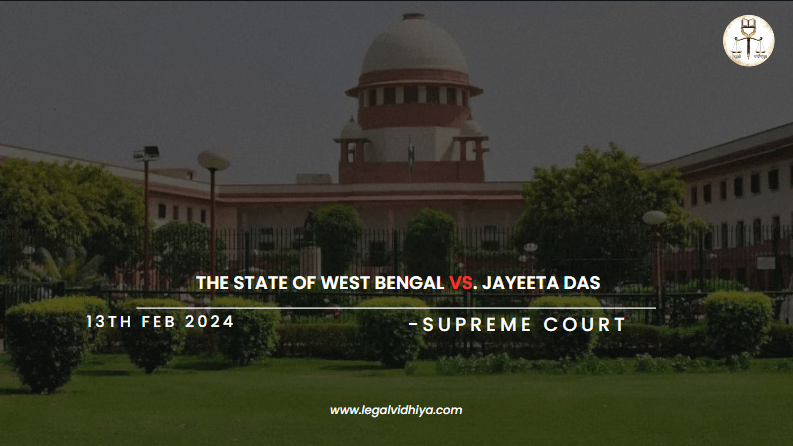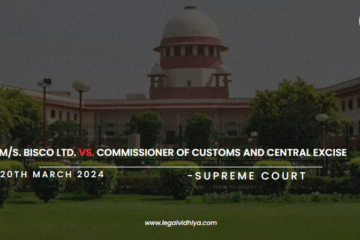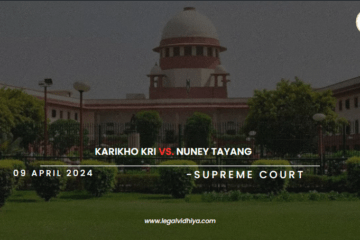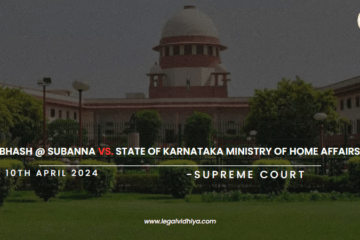
| CITATION | 2024 INSC 313 |
| DATE OF JUDGMENT | 13th Feb 2024 |
| COURT | Supreme Court of India |
| APPELLANT | The State of West Bengal |
| RESPONDENT | Jayeeta Das |
| BENCH | B.R. Gavai Sandeep Mehta, JJ. |
INTRODUCTION
The present case in the Supreme Court evolved on the incident of finding of an unclaimed and containing some documents associated with a proscribed CPI (M) group on December 16, 2011 at the Sahid Minar in Kolkata. Consequently, the time the investigating officer (IO) applied for the amendment of the charges to the more serious Unlawful Activities (Prevention) Act (UAPA) followed the initial registration of a First Information Report (FIR) against the respondent Jayeeta Das.
The Chief Judge, City Sessions Court, agrees to treat UAPA offenses as an additional list of charges made in the order dated 7th April 2022. This order was opposed by Das before the High Court of Calcutta that viewed the proceedings in this case as an infringement of freedoms guaranteed under the UAPA, and held that only a court established under the NIA Act could try the case.
The State of West Bengal filed a review Petition in the Supreme Court and raised fundamentally important issues on jurisdiction of the courts in conducting such cases and the applicability of some provisions under the NIA Act as well as UAPA. The judgment of the supreme court was considered as providing a well-needed clarification on these extensive legal challenges of already pressing public attention.
FACTS OF THE CASE
- On 28th December 2021, an unclaimed black backpack containing posters and materials related to the banned CPI (Maoist) organization was found abandoned at Sahid Minar in Kolkata. Based on a written complaint filed by SI Raju Debnath on 1st January 2022, FIR No. 01/2022, registered at STF Police Station, Kolkata against the respondent Jayeeta Das under Sections 121A, 122, 123, 124A and 120B of the Indian Penal Code (IPC).
- The respondent was apprehended on 29th March 2022. The Investigating Officer sought addition of offenses under sections 16, 18, 18B, 20, 38, and 39 of the Unlawful Activities (Prevention) Act (UAPA). The Chief Metropolitan Magistrate forwarded this to the Chief Judge, City Sessions Court, who allowed adding the UAPA offenses by the order dated 7th April 2022.
- The respondent challenged this order before the Calcutta High Court. On May 11th, 2023, the High Court quashed the proceedings against the respondent under UAPA, holding that only a Special Court constituted under the NIA Act could try UAPA offenses. The Sessions Court was barred from taking cognizance of offences under the UAPA. Therefore, the order dated 7th April, 2022 and its subsequent proceedings became void because of not having the jurisdiction.
- Aggrieved by the order, the State of West Bengal appealed to the Supreme Court. The key issue was whether the Sessions Court had jurisdiction to allow addition of UAPA offenses when no Special Court was constituted by the State under the NIA Act.
ISSUES RAISED
- Whether the Chief Judge, City Sessions Court, Calcutta had jurisdiction to allow addition of UAPA offenses when no Special Court was constituted by the State under the NIA Act.
- Applicability of Section 22 of the NIA Act regarding the power of the State Government to designate Courts of Session as Special Courts for trial of UAPA offenses.
- Interpretation and applicability of Section 43D of the UAPA concerning the extension of the remand of the accused beyond 90 days.
- The effect of the accused not claiming default bail on the ground that the charge sheet was not filed within the extended period under Section 43D of the UAPA.
CONTENTIONS OF APPEALENT
- The learned Chief Metropolitan Magistrate transferred the case to the learned Chief Judge of the City Sessions Court in Kolkata by the order dated April 5, 2022 to investigate the plea.
- Mr. Siddhartha Dave was the lawyer for the appellant, argued that Section 22 of the NIA Act would apply to the proceedings because the case involved an investigation and prosecution by the state police and not the NIA. He said that by using Section 16 of the NIA Act, the High Court erred in quashing the proceedings.
- The appellant’s counsel further argued that the Sessions Court, which had jurisdiction over the division where the offense was committed, had the sole authority to try the offences under Section 22(3) of the NIA Act because the case had been investigated by the state police and no Special Court was constituted in accordance to Section 22(1) of the NIA Act.
- On the other hand, the respondent’s counsel strongly argued that the view of the High Court towards interfering the decision of April 7, 2022 was the only legal and proper point of view. The counsel referred to the Gazette Notification dated April 29, 2011, which stated that the Central Government for the State of West Bengal had already notified a Special Court, making the decisions made by the Chief Judge and the Chief Metropolitan Magistrate illegal and without jurisdiction.
CONTENTIONS OF REPONDENT
- The learned senior counsel claimed that the accused lost the right to be released on default bail since they never applied for default bail after the expiry of 90 days and before the charge sheet was issued. Therefore, the learned counsel said that any irregularity in the remand decision was solved. During the trial, the counsel requested the court to accept the appeal, reverse the challenged decision, and allow the Sessions Court to continue with the proceedings, including the trial of UAPA offenses.
- The counsel for the respondent claimed that the High Court was right when it exercised its powers under the Section 482 of the CrPC to invalidate the decision of April 7, 2022 and the subsequent proceedings as they were invalid, and the accused didn’t plead default bail which was openly left for the court. The point of the arguer was that the proceedings initiated by the Chief Judge and Chief Metropolitan Magistrate were defective because they were outside the jurisdiction of NIA Act and UAPA as a Special Court had already been established by the Central Government for the state of West Bengal through Gazette Notification dated April 29, 2011.
- The respondent’s counsel stated that the Special Court was established to hear cases which involved UAPA offenses in the State based on the Gazette Notification.
JUDGEMENT
The Supreme Court held that the Chief Judge of City Sessions Court, Calcutta had jurisdiction to pass an order dated 7th April 2021 permitting the addition under Unlawful Activities (Prevention) Act (UAPA) charge in the case against the respondent Jayeeta Das.
The Court held that the state of West Bengal did not establish a Special Court as per the provisions of Section 22(1) of the NIA Act and so the case was within the jurisdiction of the Sessions Court because of S. 22(3) of the NIA Act, 2008.
Regarding the extension of the period of detention of the accused beyond the 90 days by the High Court, the Court pointed out that the session Court could exercise jurisdiction under Section 43D (2) of UAPA, but the Chief Metropolitan Magistrate’s extension of retention exceeding 90 days was illegal. Nevertheless, in the fact that the defence attorney did not object to bail postponement on the grounds of the late filing of the charge sheet, only one question remains that what effect does the evidence collected during illegal remand have.
Hence, the Supreme Court allowed the appeal by the State govt of West Bengal, annulled the order of Calcutta High Court dated 11th May 2023, and held that sessions court had jurisdiction in the addition of UAPA offenses against the accused.
ANALYSIS
The Supreme upheld the authority of the sessions court empowered to add UAPA offences and deal with the case when the State Government failed to designate Special Courts under the NIA Act. Under the pretext of reading this provision, sections 22(1) and 22(3) of the NIA Act was interpreted in parallel to ensure that UAPA cases do not fall into a gap of jurisdiction.
The Court correctly said that CMM committed excess jurisdiction by twice remanding the accused beyond 90 days without obtaining the necessary authorization under UAPA Section 43D (2). This ensures that the rights of accused to remand are statutorily safeguarded.
Notably, the bench did not probe into the consequences of the unreasonably extended custody instead leaving the lower court to remedy the predicament, owing to the defendant’s failure to claim default bail. This pragmatic approach finds a way to implement the statutory provisions and seeks to ensure that technical derailment of prosecutions based on procedural lapses only occurs where substantive impairment cannot be demonstrated.
As a whole, the judgment addresses the interpretative labyrinth successfully through a balanced, cautious and nuanced approach which complies with the legislative purpose and the sanctity of constitutional rights.
CONCLUSION
The judgment of Supreme Court in this case has provided much needed clarity as to how the Unlawful Activities Prevention Act (UAPA) provisions and the National Investigation Agency (NIA) Acts interact, especially on the jurisdiction of courts to hear the cases under those acts.
Through the application of the Section 22 of the NIA ACT elsewhere the Court has made sure that the jurisdiction over UAPA cases is not left vacant in the event that the State Government has not constituted a Special Court. It is unambiguously held that Sessions Court is entitled to handle the cases of that kind up to the time a Special Court is assigned.
Secondly, the Supreme Court’s judger regarding the Chief Metropolitan Magistrate’s extension of the accused’s remand beyond 90 days in absence of Sessions Court’s authorization under Section 43D (2) of UAPA further sets statutory confines for an accused’s rights concerning remand.
The notion of leaving the result of the illegally extended remand for the trial court to evaluate, considering the accused omitted the claim for default bail, shows better balance between the observance of statutory norms and the avoidance of technical breakdown of the trials based on procedural oversights, if prejudicial effect remains unproved.
Thus, this judgment acts as a guidance for inferior courts while they move through the maze of provisions of the law regarding UAPA cases keeping the fine interpretation that makes it conformable with the purpose of legislation and constitutional rights even alive in mind. REFERENCES
- SCC Online
- http://indiankanoon.org/doc/27635976/
This Article is written by Aman Raj, a student of Chanakya National Law University, Patna (CNLU); Intern at Legal Vidhiya.
Disclaimer: The materials provided herein are intended solely for informational purposes. Accessing or using the site or the materials does not establish an attorney-client relationship. The information presented on this site is not to be construed as legal or professional advice, and it should not be relied upon for such purposes or used as a substitute for advice from a licensed attorney in your state. Additionally, the viewpoint presented by the author is of a personal nature.




0 Comments